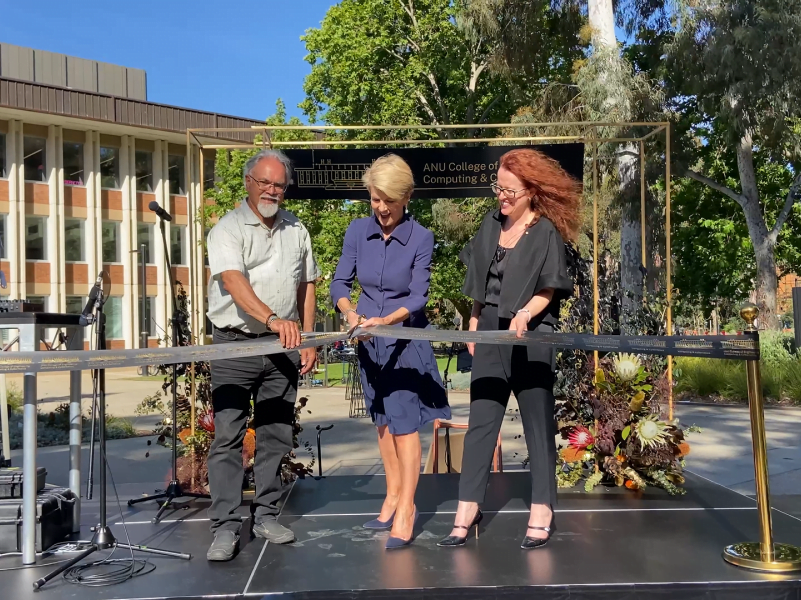After nearly two years, Professor Genevieve Bell has officially opened the Australian National University’s School of Cybernetics, which she hopes will encourage systems-based approaches to policy making.
After an impassioned illustration of the interdisciplinary heritage of cybernetics, School director and interim dean of the renamed College of Engineering, Computing, and Cybernetics Professor Bell spoke to InnovationAus.com about the cybernetics informed policy advice she brings to the Prime Minister’s National Science and Technology Council.
Having sat on the council since the end of 2018, Professor Bell brings a wealth of experience approaching the interaction of technology and humanity, using her PhD background in anthropology.

Following around two decades worth of work at Intel, in September 2017 she worked with Data61 to found the 3A Institute at ANU, which considers “the management of artificial intelligence, data, technology and their impact on humanity”, according to her LinkedIn. The institute now sits within the School of Cybernetics.
“One of the things that makes cybernetics really interesting is that it focuses on the idea of a system. For me, the really understudied analysis is about the systems level. Think about what are the critical units of analysis. We’ve had individuals, we’ve had economics, we’ve had government, we’ve had societies,” Professor Bell said.
“I think there’s this way about complex systems, dynamic systems, that have computation at their core, that lets us think really differently about what the world should be like.”
For Professor Bell, systems level thinking involves analysing the interaction and relationships between different subjects and units of analysis.
She believes “the systems that we should be focused on, and the systems that in fact build our world, are systems that always include the human, the ecological, and the technical”.
Some of the modelling tools cybernetics offers includes “feedback loops, circular causality, [and the] management of reciprocities”.
The cybernetics approach is not limited to novel technologies such as AI and quantum computing, but can be applied to “the overland telegraph line, or the steam engine, or Aboriginal fish traps”, as previously noted by School of Cybernetics Professor Katherine Daniell.
Admittedly Professor Bell notes that cybernetics practitioners need to do a better job at studying the metrics. She highlights ‘throughput’, how long it takes for something to get from point A to point B in a system, as an obvious starting point but that this is more complicated in reality.
She says systems often go unnoticed when they function properly and get called to attention when they fail.
“When you’re in the middle of them, it’s sometimes really hard to go ‘wait, is that thing part of this thing? And, if that thing happens over there, is that going to happen here too?’,” she questioned.
“I’m willing to bet most Australians are now acutely aware of supply chains, in a way they simply weren’t at the beginning of the pandemic because all of them stopped, and there was suddenly [this question of] ‘wait, where does my toilet paper come from? When is the milk going to get to me?’”
During the launch, Professor Bell outlined what she thinks the function of academics are, describing it in two parts: to constantly tell stories about the future “that are hopeful and optimistic, that all go towards justice and sustainability”, and to make sure those stories become a reality.
ANU chancellor Julie Bishop took to the stage to slice ceremonial ribbon. Prior to that, Ms Bishop distilled her understanding of Cybernetics down to “an understanding and transformation of society through technological development”.
Ms Bishop said this is particularly exciting as technologies like quantum computing, AI and robotics, and automation, are on the cusp of hitting the mainstream.
“All the experts tell us that the Fourth Industrial Revolution, the technology revolution, is only in its early stage, that some of the greatest disruptions of the way we live and work and connect and engage are still ahead of us,” Ms Bishop said.
The CSIRO Megatrends report published earlier this year notes that “the average Australian worker will need to gain an average of seven new digital skills and 103 million digital skill trainings will need to be conducted between 2020 and 2025 to [keep pace with technological change]”.
With the potential for new technologies to disrupt the Australian workforce, InnovationAus.com asked Professor Bell how her stories of optimism can be inclusive of everyone, particularly if their jobs come under pressure.
“It’s a really good question to be mindful of the fact that in transformations there are always changes. I look at the history of automation, because that’s not new, we have been automating various processes for 250-plus years…What it is to be any number of things in the 21st century is not what those jobs were in my parents or your parent’s generation,” she said.
“I think we need to do a better job of being clear about what the changes will be and being clear that sometimes what it means is that, the job may have different tasks, but the job will remain.
“We need to be better at thinking about what are the jobs that we need for our future? How do we do a better job of talking about why those jobs are important [and] why they matter? Why they help build a world that is important to all of us, and how we do a better job of laying out what the possibilities are, not just focusing on the losses.”
The ANU School of Cybernetics, which was established at the start of 2021, offers a Master of Applied Cybernetics and a PhD program.
Do you know more? Contact James Riley via Email.

